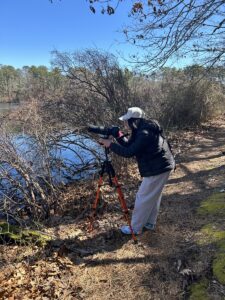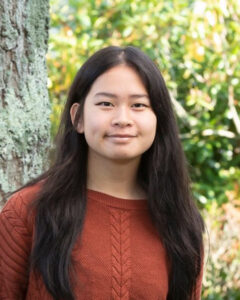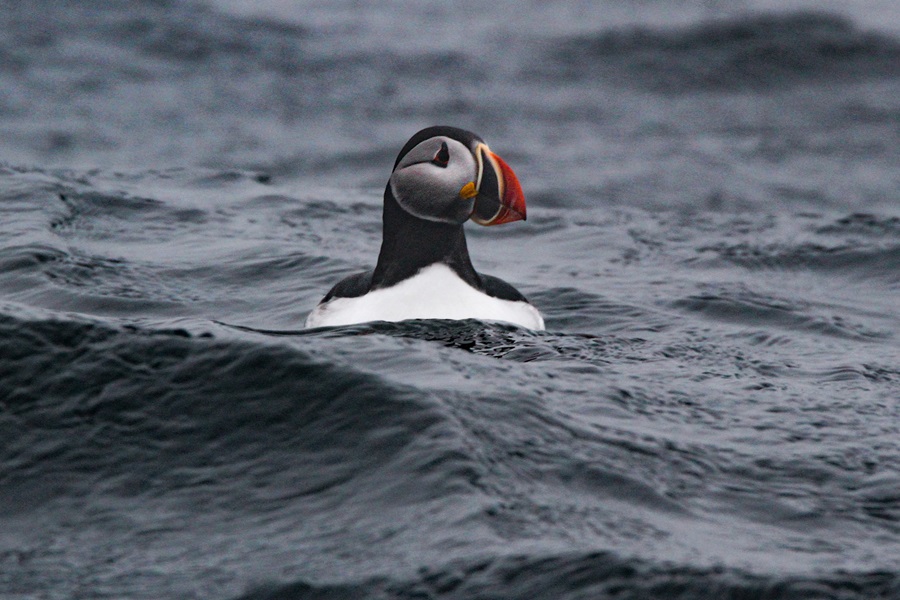Some people think birding is something only older people do — people who have time on their hands and an ability to focus that supposedly comes only with age. But I’ve been birding since I was seven years old.
I’ve always loved wild animals, and so when I came across a book at my grandmother’s house with a picture of a cardinal on the spine, I had to read it. The book was Birds of the Eastern Region: National Audubon Society Field Guide Sibley, and I was fascinated by the birds on its pages. Unlike my other animal fascinations (wolverines, big cats, deep-sea fish), some of these birds could be found in my hometown of Ottawa, Canada. I decided to try to see them all. Seventeen years later, my interest has only grown.

Megan Morey, a high school junior from Mashpee, traces her love of birds back to a similar realization. Morey began birding last year as a sophomore. She had saved up to buy a camera to photograph wildlife — she had long dreamed of traveling the world to look for rare animals. Compared to the wilds of Africa or Asia, the Cape, she figured, was pretty boring. But when she started to photograph the region’s birdlife as a warmup, she was surprised by its diversity.
“I never knew that there was this whole huge world in my back yard,” she says.
Birding, Morey discovered, is not so much a time-consuming hobby as a way of noticing the natural world. Wherever you are on Cape Cod, she says, if you look up, there’s always going to be a bird in sight. She doesn’t necessarily seek out specific birds, she says. Morey’s approach is more “Wherever I am, I bird.” Even an osprey flying over a parking lot deserves a pause, she says.
Morey, who goes to Cape Cod Academy in Osterville, says that birding has awakened her appreciation of biodiversity. She’s interested in how different animals grow and adapt to their environments. And birding has deepened her desire to protect both birds and the environment as a whole.

Morey is part of her school’s environmental club, which successfully petitioned the school cafeteria to get rid of plastic utensils. The club is now working with the school to institute a composting and recycling system. She is also part of the Cape Cod Commission’s Climate Ambassador Program, which connects her with other young environmentalists on the Cape as well as professionals from environmental scientists to policymakers. As a part of that program, Morey is working on coding a website to inform people about local environmental issues on Cape Cod.
Through birding, Morey has seen how people can contribute to large citizen science projects like eBird (an online database of bird observations) and iNaturalist (a social network for sharing biodiversity observations), both of which generate scientifically valuable data from “normal people’s” reports. If birders observe a bird carrying food, for instance, it can mean that bird has offspring that it’s feeding. “It’s like a different language to decode,” Morey says.
Last summer, Morey’s interest in birds led her to a weeklong birding summer camp on Hog Island, Maine, run by the National Audubon Society. Her participation was sponsored by the Cape Cod Bird Club, which offers a teen birding camp scholarship.
Morey learned about the Hog Island bird camp through a teacher, who also told her about the bird club scholarship. She admitted to being nervous at first, but when she arrived, she met the campers and counselors, some of whom had come from as far away as California and Florida, and they were “some of the nicest and most passionate people I’ve met,” she says.
The group traveled from the coast to the boreal forest, birding along the way. They watched tern colonies along the rocky shores, spotted a vagrant loggerhead shrike in a patch of grasslands, and climbed Borestone Mountain to spend two days in the forest away from cell service.
For Morey, the most memorable experience at camp was the day spent at the puffin nesting colony at Eastern Egg Rock.

“Puffins were one of the birds I wanted to see the most,” Morey says. She had long assumed they were restricted to Europe and remote parts of the North Atlantic, so she was blown away when she found out she could see them in Maine, bobbing in the waves and flying around the seven-acre island with a restored colony of the clown-like seabirds.
The counselors were inspiring too, Morey says. One of them, Amanda Leemann, a naturalist and environmental educator, offered advice on how to pursue biology as a career. Talking with Leemann, she says, “really helped me on my path for my future.”
When we spoke last week, Morey was touring universities on the West Coast. She says she’s intent on pursuing a degree in environmental science or a similar field. “I was thinking about going into ornithology, but I really want to broaden my scope,” she says. One thing she knows is that she wants to be near a coast — perhaps one where she can see more puffins.
The Cape Cod Bird Club Teen Bird Camp Scholarship application period is open until April 1. At press time, one slot was still available for a Cape Cod resident between the ages of 14 and 17.



